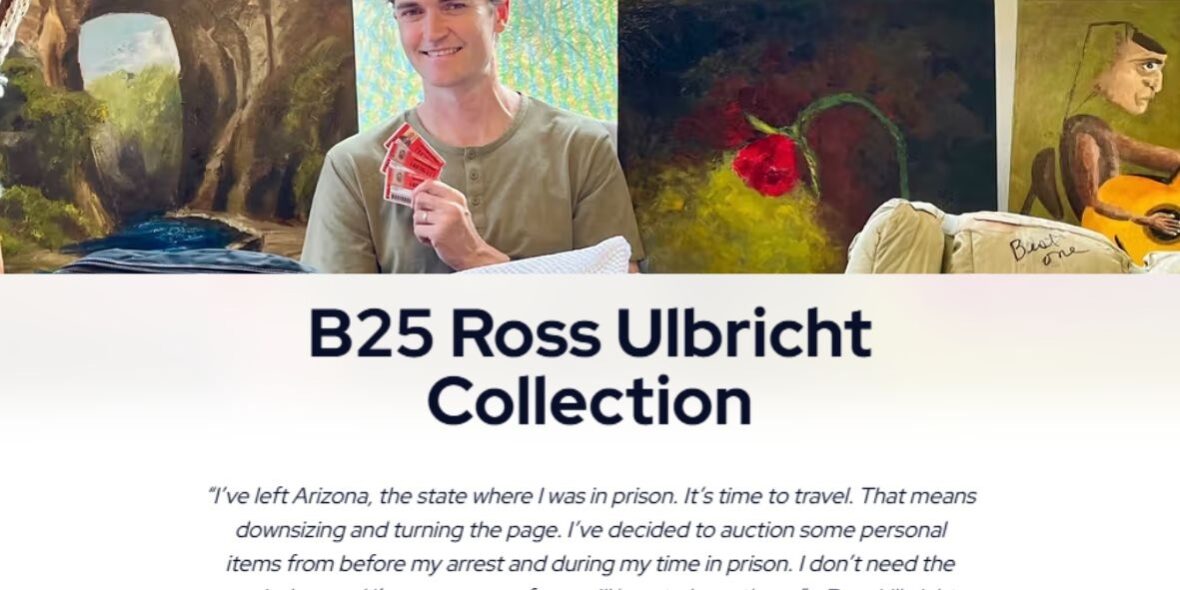Key takeaways
- Ross Ulbricht, the Silk Road creator, reentered public life after 12 years in prison by hosting a high-profile auction on a Bitcoin-only platform, Scarce City.
- He sold 13 personal items. His prison ID card sold for 11 BTC (about $1.1 million)
- President Donald Trump granted Ulbricht a full pardon in January 2025, releasing him from a double life sentence. He was sentenced for operating Silk Road, an online black market used primarily for illegal drug trafficking.
- Ulbricht also addressed a crowd at Bitcoin 2025, expressing gratitude and emphasizing themes of freedom, decentralization, and solidarity. Supporters donated over $31 million in Bitcoin, with additional contributions from Kraken, the Free Ross campaign, and other crypto enthusiasts.
- Ulbricht has now emerged as a symbol of resistance and reform, reflecting growing support for privacy, decentralization, and justice within the crypto space.
Ross Ulbricht, once the architect behind the Silk Road darknet marketplace, has resurfaced, that too with a bang. After serving 12 years of a double life sentence for operating Silk Road, an online black market used primarily for illegal drug trafficking, Ulbricht re-entered public life with an emotional and financially significant auction of personal artifacts, drawing intense attention from the crypto community.
Hosted on the Bitcoin-only platform Scarce City, the auction featured 13 intimate items spanning both pre-arrest memories and prison-era keepsakes. These weren’t just collectibles; they were symbolic chapters of a controversial life that continues to captivate.
The Auction: More of a Tribute Than a Sale
The centrepiece of the auction was Ulbricht’s final prison ID card, which sold for 11 BTC, or roughly $1.1 million. “The guard tried to get me to stop smiling for the photo,” Ulbricht said. “But my joy comes from within. So I smiled that day, even though I was in prison.”
Other items included a backpack, sleeping bag, and drum from his free life before 2013, along with prison notebooks, clothing, and artwork. One notable piece was a collaborative painting, co-created with a fellow inmate and titled Omega. It depicted a symbolic archway and sold for 1.01 BTC. “It gave me the feeling that if I could pass through it, something better would be on the other side,” Ulbricht said.
Buyers had to place a 1% collateral deposit, and bidding extended with each late offer, ensuring fair play and maximum engagement.
A Presidential Pardon and Public Return
Ulbricht’s re-emergence follows a full, unconditional pardon by former President Donald Trump in January 2025. Apart from creating headlines for the auction, Ulbricht appeared at Bitcoin 2025, where he addressed a packed audience. “You didn’t leave me. You didn’t forget me,” he said, acknowledging the grassroots efforts that advocated for his release. He focused not on past regrets, but on forward-looking values: freedom, decentralization, and solidarity.
Massive Donations Reflect Community Support
The auction was only part of a wave of financial support for him. Blockchain analytics firm Lookonchain identified a donation of 300 BTC, worth over $31 million, sent anonymously to Ulbricht.
Crypto exchange Kraken also contributed, donating $111,111 in Bitcoin to aid his reintegration. Meanwhile, the Free Ross campaign reported over $270,000 in crypto donations, and Ulbricht’s wallet received an additional $4,615 in digital assets like Ethereum, USDC, and BNB.
A Movement Reawakens
Ulbricht’s reappearance coincides with a shifting regulatory climate. The US government recently dropped charges against platforms like Tornado Cash, signalling a potential softening of its stance on crypto innovation.
In this evolving environment, Ulbricht has become more than a freed man. He now stands as a symbol of resistance, reform, and revival. Today, he is an enduring figure in crypto’s complex history. His transformation from dark web operator to philosophical spokesperson captures the renewed push to realign the crypto movement with its original ideals.
Whether Ulbricht’s second act will include formal advocacy, entrepreneurial ventures, or thought leadership remains uncertain. What is clear: his return has sparked a renewed dialogue around justice, freedom, and the future of decentralization.







